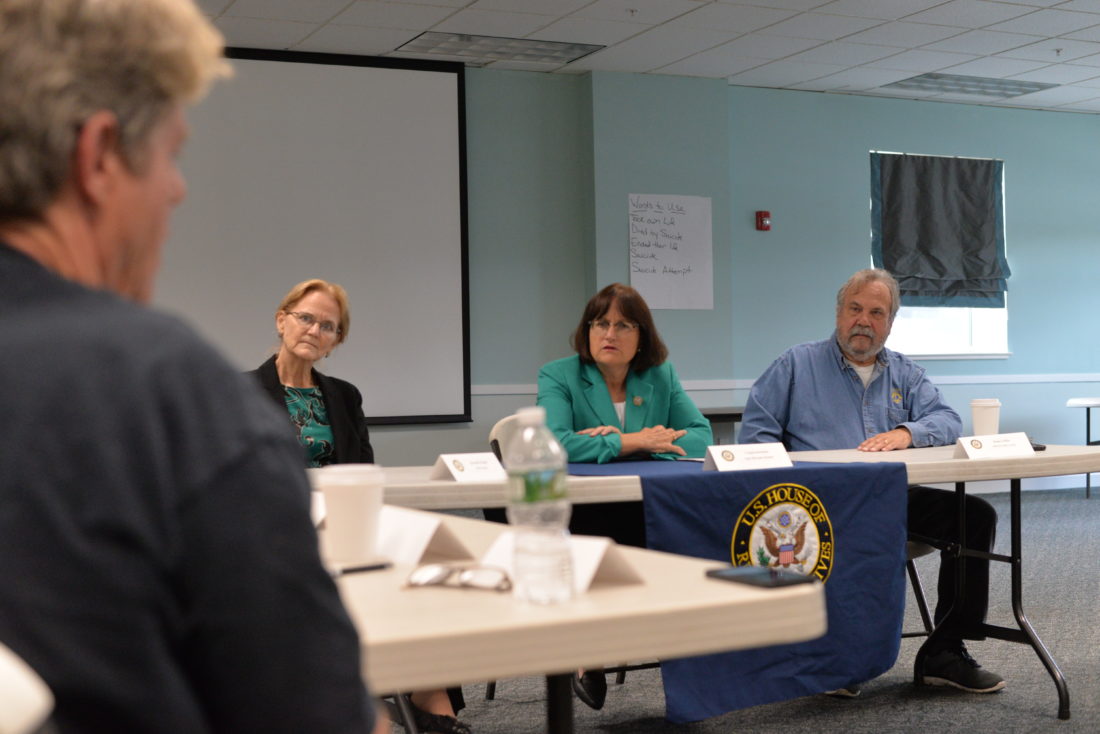Funding the fight against opioids

Staff photo by ADAM URQUHART U.S. Rep. Annie Kuster, D-N.H., on Thursday listens to a presentation regarding the state’s opioid epidemic.
NASHUA – Whether they are Democrats or Republicans, one thing on which New Hampshire leaders seem to agree is that overcoming the opioid epidemic requires vast resources and a united front.
“This epidemic was different because it’s rural communities and it tends to be small states, like West Virginia and New Hampshire, where we don’t have the resources,” U.S. Rep. Annie Kuster, D-N.H. said during a Thursday stop in Nashua.
This week, leaders in both political parties expressed appreciation for the millions of dollars worth of new federal money on its way to the Granite State to fund the fight. State officials expect to receive $45.8 million during the course of two years through the Substance Abuse and Mental Health Services Administration (SAMHSA). This is a division of the U.S. Department of Health and Human Services, which is part of the executive branch under President Donald Trump.
“We are grateful to SAMHSA for this funding opportunity, which will allow New Hampshire to design a new streamlined system of prevention, treatment and recovery services,” Gov. Chris Sununu said in a statement.
“This substantial increase in funding is the product of a long-term effort in Congress to increase federal support for communities hardest hit by the opioid epidemic,” U.S. Sen. Jeanne Shaheen, D-N.H., added regarding the funding.
Meanwhile Kuster is on the campaign trail in her bid to win re-election against Republican Steve Negron, of Nashua. Thursday, she visited Harbor Homes to hear from families affected by the opioid crisis. Some of those present during the roundtable discussion have, unfortunately, endured the tragedy of losing children to addiction, and Kuster acknowledged their hardships and heard about what these families are doing now to prevent others from experiencing similar situations.
Those joining Kuster Thursday included advocates Joe Fitzpatrick, Jim Zanfagna, Ann Marie Zanfagna, Chuck Rosa and Mary Rosa; Addiction Policy Forum representatives Doug Griffin, Pam Griffin, Lindsay Messina and Braeden Kelly; and Alexandra Hamel, representing Harbor Homes.
Kuster said she continues fighting for additional federal funding because much of it has, historically, gone to large metropolitan areas.
“Now, we have a funding formula that will take into account the states that are the hardest hit,” Kuster said. “So, there’s additional funding for the top 10 states, based upon deaths-per-population, and that’s where New Hampshire is very much near the top.”
Kuster said in the 1980s, New Hampshire had 1,000 treatment beds across the state, but officials did not necessarily value the treatment that was being provided, so the number fell.
“We don’t say to a diabetic, ‘I’m not going to treat you — you just ate cake,’ or ‘I’m not going to hire you,'” Kuster said. “We say, ‘That’s a really tough illness — how can we help you get through your life.'”
With less stigma associated with diabetes, people are more likely to find open arms and help through their disease. Kuster hopes members of society can look at those suffering from addiction in a similar manner.
Adam Urquhart can be reached at 594-1206 or aurquhart@nashuatelegraph.com.



